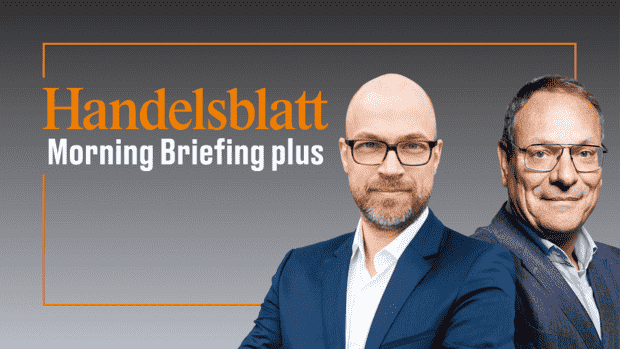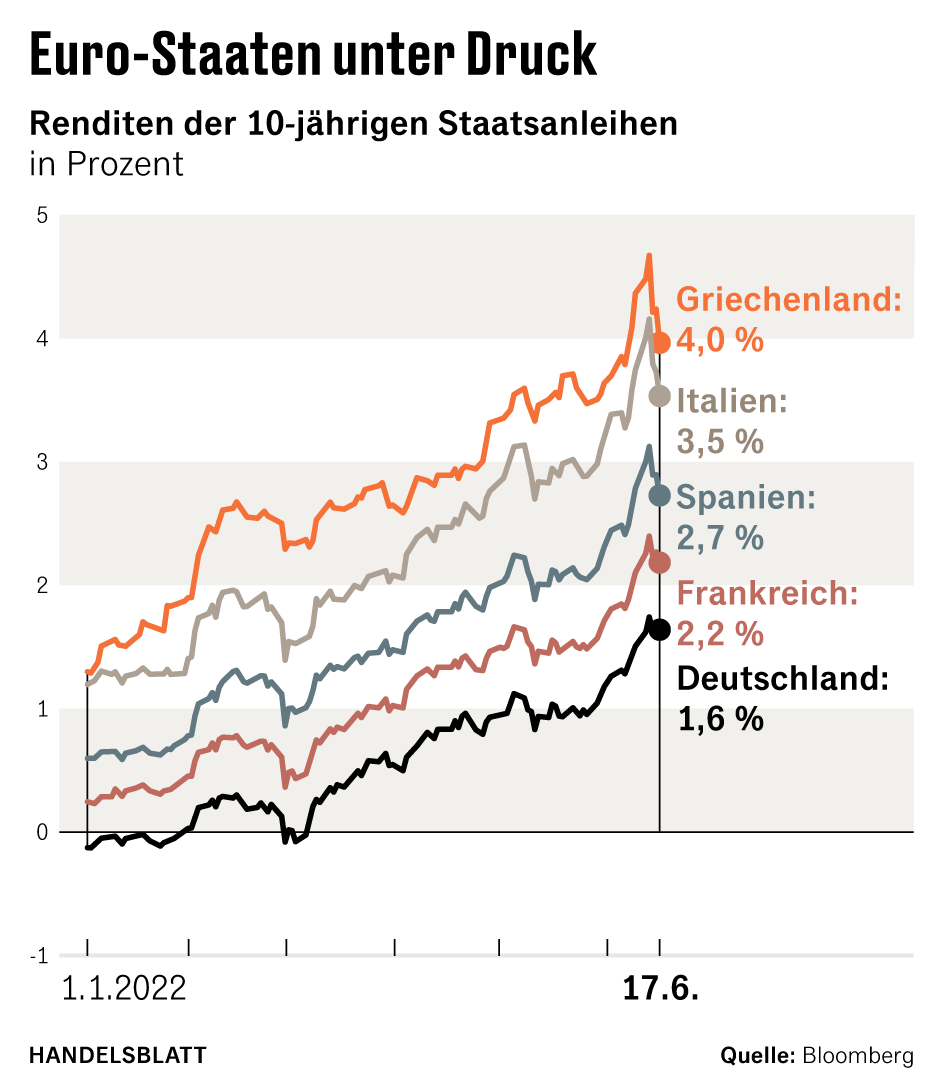Good morning dear readers,
we have difficult months ahead. The turnaround in interest rates is causing turbulence on the financial markets. With rising bond yields in southern Europe, fears of a new euro crisis are returning. And at the same time, Vladimir Putin is slowly turning off the gas tap.
And as is so often the case, the federal government is reacting to the uncertain situation with rescue programs. Additional spending requests of over 25 billion euros have been received by Finance Minister Christian Lindner, according to Handelsblatt information. It’s the same as always: as soon as the mood deteriorates, fully comprehensive insurance fever breaks out in Germany.
But the problems are too big to be able to bury them under state billions. The long-term way out can only be growth and renewal. Perhaps this federal government should – despite all the crises – reflect on what it actually wanted to be, namely a “progressive coalition” that sets the “course for a decade of social, ecological, economic, digital and societal renewal”.
Top jobs of the day
Find the best jobs now and
be notified by email.
At least that’s how much potential there is in Europe Handelsblatt Innovation Week shown. For seven days, our editorial team focused on all those who are working on the future of our continent: researchers, entrepreneurs, politicians and investors.
To the highlights of the past few days was the intensive conversation with Biontech co-founder Ugur Sahin about a revolution in medicine that is just beginning, Germany as a location for innovation – and the further course of the corona crisis. What is the difference between his company and Big Pharma? Sahin: “Our superpower is not a global network for sales, our superpower is innovative strength.”
To the Innovative strength of Europe then it went on that Handelsblatt Innovation Summit in Dresden. Here we interviewed scientists, founders and established entrepreneurs for seven hours on numerous stages. We talked about new ideas, creative processes – but also about one of the biggest crises in the coming years: the shortage of skilled workers, which affects everyone.
Infineon CEO Jochen Hanebeck in a podcast interview.
Incidentally, the conference was also an innovation even. We broadcast from a research center at the TU Dresden – where I recorded a live podcast with Infineon boss Jochen Hanebeck.
Other locations: the university’s 5G lab, chip start-ups, a house made of carbon concrete – and the city center.
Perhaps the most important basis for innovations, are networks of scientists, entrepreneurs, investors and traditional companies. The fascinating series of Handelsblatt correspondents from Singapore, Helsinki and a small US city that is already regarded as the better Silicon Valley shows how this can lead to world-class technology locations: Raleigh.
Germany, on the other hand, falls behind internationally, since 2020, industrial companies have been investing less in research and development. And the productivity of scientific research is declining, argues Merck boss Belén Garijo in the Handelsblatt. Federal Research Minister Bettina Stark-Watzinger wants to tackle all of this. How exactly, she explains in an interview with my colleague Barbara Gillmann.
What else kept us busy this week:
1. The massive drop in gas supplies from Russia causes considerable unrest. Economics Minister Robert Habeck is considering enacting energy-saving measures by law to counter possible bottlenecks. That’s not enough for the industry: the economy is demanding that Berlin immediately switch off gas-fired power plants that only generate electricity. One thing is clear: the risk of an acute gas shortage is increasing dramatically.
2. The turnaround in interest rates is here – and it comes as it must: The markets go on a rollercoaster ride. Investors are getting more nervous, many are anticipating a recession. Our Frankfurt Markets team analyzes that investors will therefore have to reckon with falling prices for months to come – and proves this with the help of a key figure.
3. The strategists at the world’s largest hedge fund, Bridgewater, have a very similar view – and position themselves in a big way for falling stock markets. With 6.7 billion euros, they are betting on falling prices for 22 top European stocks.
4. After interest rates on Italian government bonds had risen significantly and the European Central Bank surprisingly called a crisis meeting on Wednesday, the finance ministers also focused on one question: is the euro crisis returning after the war? The number of financial market experts who answer this question with a clear “no” is falling rapidly. For Italy, interest rates at 4.2 percent for debt securities with a term of ten years have risen above the four percent mark for the first time since 2014, Greece even had to offer investors 4.6 percent.
5. Traveling has been a torture for weeks. Hardly a train journey without delays. And there is hardly a flight without cancellations, baggage congestion or hours of waiting. For air travelers, however, the real chaos could be yet to come. Lufthansa, of all companies, must reckon with massive strikes.
6. The situation at Lufthansa is now so tricky that executives are considering reactivating the retired A380 due to the enormous demand, reports Handelsblatt aviation correspondent Jens Koenen. Let’s hope that the pilots who can fly the giant bird aren’t on strike.
7. The cover of our Friday issue sums up the situation of all those who are currently renovating or building a house – or simply want to buy it: Not only are real estate prices still rising in many regions, but also interest rates on real estate loans and the costs of wood, steel and Insulation material go through the ceiling. However, anyone who gets bills at all can count themselves lucky, because there are often no craftsmen who can install all the expensive material. Our big report for the weekend is about this misery – and the possible ways out. The title is also the start of the large series Trendviertel, in which our real estate team analyzes the situation in the most important regions of Germany.
8th. The switch to e-mobility was difficult enough for the German car manufacturers. The real problems, however, are caused by the software. The tech transformation is not only difficult for Volkswagen. Mercedes and BMW are similar. At the same time, the corporations are entering into delicate technology partnerships. The Handelsblatt car team analyzes what that means for their future. It’s a lesson in transformation and a new world where friends and foes are no longer so easy to tell apart.
9. There’s a myth about people in their twenties, and it goes like this: younger colleagues want total freedom. They would rather enjoy life than work too hard. And it is often said that they prefer not to see the inside of an office at all. But much of this is wrong, writes my colleague Julia Beil. Using five graphics, she describes how Generation Z really ticks. Important findings, because by 2030 the “GenZ” will make up a good third of the world’s working population.
I wish you a relaxing weekend.
It greets you cordially
Her
Sebastian Mathes
Editor-in-Chief of the Handelsblatt
You can receive the Morning Briefing plus free of charge as part of your Handelsblatt digital subscription or subscribe separately here.



